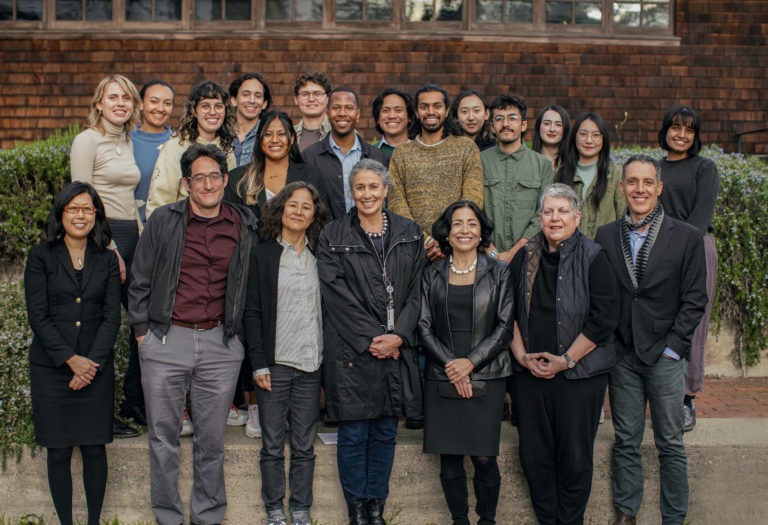Taking Aim at Disinformation and Misinformation, Deans and Center Heads Reach Out Across Campus at UC Berkeley To Launch “Our Better Web”

There are 26 words that have made the Internet what it is today. “No provider or user of an interactive computer service shall be treated as the publisher or speaker of any information provided by another information content provider.” These words are enshrined in Section 230 of the Communications Decency Act.
The statute, which has been in effect for a quarter of a century, largely protects tech companies from lawsuits based on the content they host. While traditional news organizations such as newspapers and television stations can face stiff judgements for publishing libelous or slanderous content, Section 230 indemnifies tech businesses like Google, Facebook (Meta) and WhatsApp.
There’s a growing consensus that Section 230 has come with significant social costs, including harassment and the spread of disinformation or misinformation—often disproportionately targeted at our most vulnerable communities–and that this threatens democracy.
Together with a leadership team with specialties in law, algorithms, computer science and public policy, Berkeley Journalism has formed a multipronged initiative, “Our Better Web” to study and inform legislation on disinformation and illegal activities on social media platforms.
Representing each discipline is a top expert from campus: Erwin Chemerinsky, dean of Berkeley Law; Hany Farid, former Associate Dean of the School of Information and an expert on digital forensics; Janet Napolitano, former Homeland Security Chief who directs the new Center for Security in Politics; Brandie Nonnecke, director of the CITRIS Policy Lab; and Jennifer Chayes, associate provost of the Division of Computing, Data Science, and Society.
The project will be overseen by Nonnecke, founder and director of the CITRIS Policy Lab, which supports interdisciplinary tech policy research.
Like its leadership team, the initiative brings together students from across campus to analyze proposed legislation and produce responsible journalism to inform the public about possible solutions. A small team of students is already gathering all bills proposed at the federal level that seek to amend, revoke, or modify Section 230–with six deans and center heads supervising and meeting biweekly to analyze. The team will use their analysis to recommend technology and policy strategies for mitigating online harms.
At the same time, two veteran journalists are leading a class at Berkeley Journalism where a small group of students from across campus will work together to produce audio stories aiming to inform the public about the role Section 230 has played in the mis- and disinformation crisis and solutions to address the problem.
Queena Kim, adjunct professor of audio at Berkeley Journalism and senior editor at Reveal, is co-teaching the class called J276 Digital Accountability: Exploring Section 230. Aaron Glantz, an award-winning investigative reporter and senior investigations editor at NPR’s California newsroom, is co-teaching with Kim, who has a background in technology coverage.
In addition to journalism students, the class includes students from the Schools of Law, Public Policy, and Information. Each student who has been accepted into the class will receive a $1,000 stipend following the delivery of a well-researched audio story to air on public radio stations and podcasts.
“It’s such an exciting opportunity to be part of this university initiative,” Kim said. “We’ve filled the class with an impressive group of students with subject-matter expertise from across the schools. The goal now is to start making the public aware of Section 230, and what the group is interrogating about what solutions our policy-makers and tech are proposing.”
“Joining forces on campus to confront the scourge of disinformation in this country while protecting freedom of speech is of critical interest to us all,” Anand, dean of Berkeley Journalism, said. “We are deeply grateful to Advisory Board member Simone Coxe for supporting this research-driven initiative.”
Coxe, with deep roots in the Bay Area’s public and nonprofit media world, said “I could not be prouder to support Dean Anand’s multidisciplinary initiative to help us inoculate society against the epidemic of disinformation.”
“We’re witnessing a sharp rise in disinformation, extremism, and harmful content online,” Brandie Nonnecke, the CITRIS Policy Lab director, said. “In order to effectively address these challenges, we must train students in multidisciplinary approaches where they learn the important connections between law, policy, journalism, data science and engineering. In doing so, we’re training future leaders who can see these complex interconnections and envision ways to effectively build and govern a more trustworthy internet.”
“I am very excited to be part of the “Our Better Web” initiative which brings together deans, faculty, and students from across campus,” said Erwin Chemerinsky, the law school dean. “The issue is enormously difficult: how to preserve the internet and social media as uniquely important media for speech, while also combating misinformation and the harms of online speech. I am hopeful that this interdisciplinary group can make a real difference in the debates, policy-making, and legislation.”
Hany Farid, the expert on deep fakes, says that while today’s internet is being “weaponized” against individuals, societies, and democracies, there is a general consensus that reform and changes are needed, but little consensus on what that change should look like. “What is needed to move us forward is a broad and deep understanding of the underlying technical, social, economic, policy, and legal issues. I can think of no better group of academic scholars to help us tackle what is arguably one of the most pressing problems facing us today.”
“Our Better Web” is a multidisciplinary initiative focused on some of the key public policy questions our nation— and globe— face today,” Janet Napolitano, director of the Center for Security in Politics, said. “I believe this initiative provides society with great value as we see Berkeley, a world-leading public institution, bringing its students to the conversation to help formulate solutions for policymakers and elected officials.”
